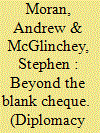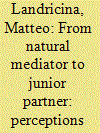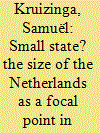|
|
|
Sort Order |
|
|
|
Items / Page
|
|
|
|
|
|
|
| Srl | Item |
| 1 |
ID:
147590


|
|
|
|
|
| Summary/Abstract |
When President Gerald Ford decided to maintain and deepen arms relations with Iran, he cemented a momentum that became near impossible for a successor to break by continuing the policy of his predecessor Richard Nixon. Nixon had given the Shah of Iran a “blank cheque” to purchase whatever American arms he desired—short of nuclear weapons. Although Ford’s authority would be challenged by members of his own Administration and a Congress seeking to claw back some of its authority, the need to support allies in the Middle East against the threat of the Soviet Union, even during a time of détente, remained paramount.
|
|
|
|
|
|
|
|
|
|
|
|
|
|
|
|
| 2 |
ID:
147588


|
|
|
|
|
| Summary/Abstract |
“Finlandisation” has become a buzzword and suggested solution to the on-going Ukrainian crisis. However, in Finland, Finlandisation tends to be a pejorative term because of its negative effects on Finnish domestic politics. Negative effects notwithstanding, Finland’s Cold War experience often appears as a success: it preserved its democratic system, prospered economically, and strengthened its international status. This analysis examines the historical evidence of what role Finlandisation—understood as a policy of collaboration and friendship with the greatest potential security threat to a country’s sovereignty and as a political culture related to that policy—played during the Cold War era. Did the strategy of accommodation go too far and was it superfluous to Finland’s survival and success? In this context, the article also discusses the “dangers” of Finlandisation and the gradual end of the policy.
|
|
|
|
|
|
|
|
|
|
|
|
|
|
|
|
| 3 |
ID:
147587


|
|
|
|
|
| Summary/Abstract |
This analysis finds basis largely on the protocols of the three West German diplomatic conferences held in Africa in 1959, 1962, and 1968. It scrutinises the idea, advanced by part of Bonn’s foreign policy élite at the end of the 1950s, that the Federal Republic of Germany had a “special mediatory role” to play between the West and Africa in the age of decolonisation. The Federal Republic played a significant indirect role, especially on the economic side, in keeping Africa tied to the West after the end of colonialism. However, because of its exposed political situation in Europe, it was never in a position to pursue a real mediating effort in Africa’s decolonisation conflicts, therefore limiting its ambitions to that of “junior partner” of the former colonial Powers in the second half of the 1960s.
|
|
|
|
|
|
|
|
|
|
|
|
|
|
|
|
| 4 |
ID:
147591


|
|
|
|
|
| Summary/Abstract |
In July 2015, after more than a decade of negotiations, the international community and Iran finally reached agreement over Iran’s nuclear programme. All of the work that produced the Joint Comprehensive Plan of Action [JCPOA] was nearly undone, however, by the United States Congress, which came close to killing the agreement. This episode emphasises the fact that international negotiations are “two-level games” in which policy-makers must take into account not only their own objectives and those of their interlocutors but also the interests of domestic constituencies if they are to secure the “ratification” of an agreement. In many cases, securing the consent of those constituencies is unproblematic, whether because the matter at hand is uncontroversial, domestic interests are disengaged, or policy-makers have sufficient autonomy from them to ignore their objections. In other cases, however, the domestic game can play a huge part in determining the eventual outcome of the negotiating process. As the intensity of the debate within the United States in 2015 and the narrowness of the margin by which the JCPOA survived suggest, the American–Iranian dimension of the nuclear negotiations falls into the latter category.
|
|
|
|
|
|
|
|
|
|
|
|
|
|
|
|
| 5 |
ID:
147589


|
|
|
|
|
| Summary/Abstract |
This analysis examines the efforts by the Palestine Liberation Organisation [PLO] to formalise relations with the United States before and after the October 1973 Arab–Israeli War. It details the public and private attempts by PLO Chairman Yasir Arafat to present the organisation as a legitimate partner for negotiations with Israel. However, the American secretary of state and national security advisor, Henry Kissinger, hindered the PLO’s diplomatic initiatives during the Richard M. Nixon and Gerald R. Ford administrations. Kissinger viewed the PLO as an impediment to his efforts to resolve the Arab–Israeli conflict through separate peace agreements, rather than a comprehensive solution. Despite Washington’s objections to the PLO, the organisation had regional and international legitimacy, its stature aided by its political and ideological allies. Yet these ties also contributed to the PLO’s involvement in the Lebanese civil war. Kissinger encouraged Syria’s June 1976 invasion of Lebanon to weaken, if not destroy, the PLO as an independent actor. Although the PLO survived Syria’s intervention, Kissinger’s actions and agreements limited the diplomatic initiatives of the Jimmy Carter Administration.
|
|
|
|
|
|
|
|
|
|
|
|
|
|
|
|
| 6 |
ID:
147586


|
|
|
|
|
| Summary/Abstract |
Throughout the 1920s, distrust and contention marked Anglo–Soviet relations, culminating in the diplomatic break in 1927. In 1929, the incoming Labour government successfully pursued its objective of re-establishing diplomatic relations with Moscow, but the follow-up in terms of ambassadorial appointments was far from routine for either side. This analysis shows that internal pressures complicated decisions about whether to appoint career diplomats or choose political figures. Resisting both claims from enthusiastically hopeful Labour backbenchers and criticisms from the left wing media, the British foreign secretary, Arthur Henderson, chose a Russian-speaking career diplomat. On the Soviet side, the first choice was a controversial politician, but then replaced by a financial expert, albeit one tainted as a defeated political opponent of Josef Stalin. Whilst both ambassadors could be considered “professionals,” neither was able to have a deep impact on the relationship, which remained troubled.
|
|
|
|
|
|
|
|
|
|
|
|
|
|
|
|
| 7 |
ID:
147585


|
|
|
|
|
| Summary/Abstract |
Do small states behave in an appreciably different fashion than their larger counterparts? Social scientists and historians have, for decades, searched for the defining features that set small states apart from larger ones and have come up empty. This analysis suggests that rather than searching for another set of membership criteria, focus should be on the explanatory power of the discourses surrounding the size of states. As this article demonstrates, based on a reading of Dutch international history from the late nineteenth century to the advent of the Second World War, the changing shape of discourses surrounding the “smallness” did historically influence foreign policy practices.
|
|
|
|
|
|
|
|
|
|
|
|
|
|
|
|
| 8 |
ID:
147584


|
|
|
|
|
| Summary/Abstract |
This article considers one aspect of Britain’s “great Eastern crisis” of 1875–1878. It examines in detail the claims that for two months in early 1878, an “inner Cabinet” led by the prime minister, Benjamin Disraeli—Lord Beaconsfield—in effect replaced the foreign secretary, Lord Derby. With the full range of evidence relating to the “inner Cabinet” never previously explored, this analysis assesses the critical diplomatic phase and the way in which that phase was represented in the context of the 1879–1880 general election campaign. It suggests that electoral considerations drove senior Conservative politicians to construct a retrospective narrative of foreign policy, which has in turn affected the historiography. Exploring the story of the “inner Cabinet” addresses unanswered questions about 1878, accounts for the story’s later emergence, and at the same time illuminates party-political debate about foreign policy.
|
|
|
|
|
|
|
|
|
|
|
|
|
|
|
|
|
|
|
|
|